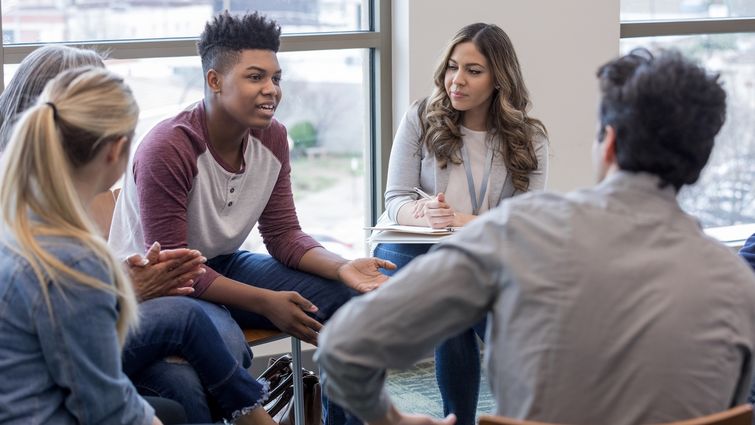

Kids and teens gain unique benefits from group therapy not available in 1:1 treatment
With a growing number of children and adolescents seeking therapy for their mental health needs, many opt for one-on-one treatment with a therapist. While individual treatment is effective and can have a significant impact on a youth’s mental health, a lesser-known form of treatment –– group youth therapy –– is designed to provide youth with a supportive environment where they can learn coping skills, process their emotions, and connect with others facing similar challenges.
Unlike individual therapy, group therapy fosters a sense of community, reducing feelings of isolation and reinforcing the idea that no one is alone in their struggles. Numerous studies find that group therapy is not only effective, but “kids and adolescents treated with group therapy were better off at the end of treatment than 73% of those who were not.”
Kristie Kenney, LMFT, a Clinical Therapist at Loma Linda University Behavioral Health, explains the various reasons a child or adolescent might join group youth therapy and how it can make a significant impact in a short amount of time.
Group vs 1:1 therapy
While individual therapy offers privacy and a personalized approach, Kenney says that group therapy provides unique benefits that may be particularly valuable for youth patients.
“The most significant advantage of group therapy is social support,” she says. “They have the ability to connect with other peers that may be experiencing the same struggles.”
Many teens struggling with depression, anxiety, or suicidal thoughts feel isolated and like they are the only ones going through a difficult time. A group setting allows patients to share similar struggles, which Kenney says can be a powerful motivator for healing.
Group therapy can also motivate patients, especially when they see other group members getting better. Witnessing peers make progress is an inspiring dynamic not applicable in 1:1 therapy that can inspire participants to stay engaged and work toward their own recovery.
The structure of group youth therapy
Unlike 1:1 therapy, which typically takes place 1 hour a week for an indefinite amount of time, group therapy is a carefully structured 8 – 10 week program consisting of three-hour sessions held three times a week. Therapy sessions are typically held during the week after school hours so that school is not impacted.
Each session is divided into three key components: check-ins, skill-building, and family participation.
Group check-in: The first hour of therapy begins with a check-in where patients discuss their current mental health, including concerns such as depression, anxiety, suicidal ideation, self-harm urges, substance use, and any potential setbacks or challenges they may be facing. During this time, the therapist offers feedback while allowing peers to provide additional team support through words of encouragement, validation, and affirmations.
Psychoeducation: The second hour focuses on skill-building, where the therapists introduce new skills such as coping strategies, anger management, cognitive behavioral therapy, and approaches for addressing depression, anxiety, self-harm, suicidal thoughts, and self-esteem. The youth learn how to apply each skill to their daily life through techniques and interactive activities.
Multifamily Group: The final hour includes family participation, where parents and youth engage in discussions and exercises centered around the skill learned that day. The goal is to improve communication and help family members develop tools to support their loved one beyond the therapy sessions. Multifamily group also provides an opportunity for parents to connect with others facing similar challenges, which can help reduce feelings of hopelessness.
Who qualifies for group therapy
Youth ages 8 – 17 are typically eligible for group therapy. Kenney says that group therapy is recommended for adolescents facing challenges such as:
-
Depression
-
Anxiety
-
Suicidal ideation or attempts
-
Social and academic stress
-
Family conflict
-
Low self-esteem or self-worth
-
Experiences of trauma or bullying
Group youth therapy provides an invaluable space for youth to process their emotions, learn critical coping skills, and build supportive relationships. By combining professional guidance with peer and family support, this approach offers a well-rounded method for addressing youth mental health challenges.
If you’re unsure if you or your loved one should join group therapy, take this short assessment or call 909-558-9113.


